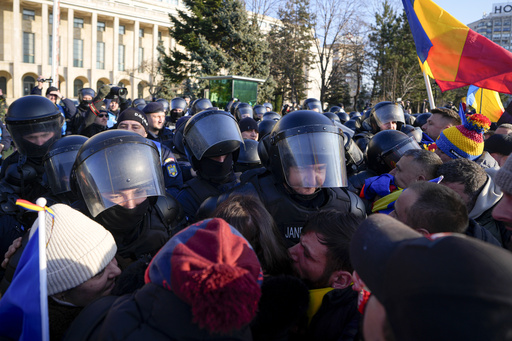BUCHAREST, Romania — In a significant political development, Romanian President Klaus Iohannis announced his resignation on Monday amidst escalating demands from populist opposition factions. This decision comes just two months after the country’s highest court nullified a presidential election. Iohannis, in a heartfelt message, stated, “To spare Romania from this crisis, I am resigning as president,” confirming his departure from office on February 12.
At the age of 65, Iohannis has been in the presidential role since 2014, having fulfilled two full terms of five years each. His presidency was unexpectedly prolonged in December when the Constitutional Court invalidated the results of the presidential election just days before a scheduled runoff on December 8. This upheaval followed the surprising success of far-right populist Calin Georgescu in the first round, amid rising allegations of Russian interference and electoral malpractice.
Various opposition parties, such as the far-right Alliance for the Unity of Romanians (AUR), the nationalist S.O.S party, and the Party of Young People, along with some members of the reform-minded Save Romania Union party (USR), aimed to force Iohannis out through a parliamentary motion. A number of lawmakers from the ruling coalition were also anticipated to support the motion.
Iohannis criticized the attempts to remove him, stating, “This is a useless endeavor because I will leave office in a few months after the election of the new president.” He firmly defended his record, asserting he has never breached the constitution and labeled the move as detrimental to Romania’s stability. He warned that the repercussions of his potential ousting would evoke “long-lasting and highly negative” outcomes for the nation, an EU member since 2007 and part of NATO since 2004. He expressed concern that Germany and the US would not comprehend Romania’s decision to dismiss a president while elections were imminent.
Following the announcement of his resignation, tensions escalated in Bucharest, leading to clashes between Georgescu’s supporters and police, resulting in the use of tear gas to disperse the gathering crowd.
The timelines for a new election have been established, with the first round set for May 4 and a potential runoff scheduled for May 18 if no candidate secures more than 50% of the vote. It currently remains uncertain whether Georgescu will appear on the ballot in the upcoming election.
Georgescu celebrated Iohannis’ resignation as a “victory for the people of Romania” and called for the continuation of the presidential election starting from the second round.
Though an interim president has yet to be named, it is expected that the president of the Senate will assume the role of acting president, albeit with limited powers. Should that not be feasible, the next in line would be the president of the Chamber of Deputies, as stipulated by the constitution.
Political consultant Cristian Andrei weighed in, suggesting that Iohannis’ resignation was a preferable outcome for Romania compared to a potential referendum, which could have further empowered populist sentiments. However, he acknowledged that the situation would not resolve the broader discontent and that uncertainty surrounding the ruling coalition and presidential candidates is likely to escalate.
Elena Lasconi from the USR, who was set to compete against Georgescu in the runoff, remarked that Iohannis’ resignation was overdue and “far too late to be considered honorable.” She expressed her satisfaction that the pressure from USR prompted Iohannis to step down, indicating their intent to continue pushing for significant reforms in state institutions. “We need truth, justice, and an authentic leader who can keep us firmly oriented toward the West,” she declared.
In a post on social media, George Simion, the AUR party leader, expressed jubilation over Iohannis’ resignation, stating, “The usurper is finally gone,” and suggested that had he not quit, he would have faced impeachment from the Romanian Parliament.



